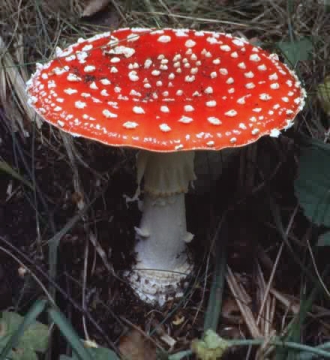Scientific American recently reported on a recent study of psilocybin mushrooms, commonly called magic mushrooms. Neuroscientist Roland Griffiths and his team at the Johns Hopkins University in Baltimore recruited 36 middle-aged Americans with no previous psychedelic drug experience and gave them the trip of their lives:
[T]he subjects lay down on a couch in a comfortable, living room-like environment and were encouraged to use an eye mask to block out visual distraction and headphones that offered classical music. […]
Immediately following the roughly eight-hour sessions, the participants were asked to fill out a series of questionnaires designed to probe the nature and quality of the experience. Twenty-two out of the 36 volunteers described a so-called mystical experience, or one that included feelings of unity with all things, transcendence of time and space as well as deep and abiding joy.
In follow-up interviews conducted two months later 67 percent of the volunteers rated the psilocybin experience as among the most meaningful of their lives, comparing it to the birth of a first child or the death of a parent, and 79 percent reported that it had moderately or greatly increased their overall sense of well-being or life satisfaction. Independent interviews of family members, friends and co-workers confirmed small but significant positive changes[.]
The use of psychedelic drugs dates back millennia. The psilocybin mushrooms used in the John Hopkins study are revered in some Central and South American cultures, and stone carvings depicting the mushrooms that date back to 500-1000 BC have been found there.

The brightly colored Amanita muscaria, pictured above, also has a long cultural history. Its common name is fly agaric because of the old practice of soaking pieces of it in milk and then leaving the milk out for flies, which drink the milk and die.
This mushroom belongs to the same family of mushrooms as some of the most toxic mushrooms in the world, like the Destroying Angel, and can be found in many parts of North America, including Southern Ontario, but it is not deadly like its relatives.
It does contain a number of hallucinogenic compounds, and like psilocybin mushrooms has been used by some cultures as a ritualistic or shamanistic drug, especially in Siberia. Some believe that the Berserkers, Norse warriors who swore allegiance to the sky god Odin, may have worked themselves into murderous fury before battle with its help.
In spite of their ancient, mystical history – or perhaps because of it – the use of psychedelic drugs is stigmatized in most modern societies. Mystical, spiritual experiences achieved through drugs are ersatz compared to Jesus’ work in one’s soul, a Christian may comment.
In fact, few religions have any regard for spiritual experiences achieved in ways other than the doctrinal ones. (Interestingly, Griffiths intentionally chose “spiritual” people for the study because, he said, “volunteers who had some engagement with prayer, meditation, churchgoing, or similar activities would be better equipped to understand and consolidate any mystical-type experiences they might have”.)
But most people, religious or not, are apt to dismiss drug-induced mystical revelations – “transcendence of time and space”, for example – as not real, or at least, not as real as experiences achieved without the use of substances. But in the mind, what is a real experience?
I had a conversation with a friend who recently ceased taking anti-depressants, which he had successfully used for several years to treat his moderate depression. Some of the symptoms started to return soon after stopping treatment, causing him to reconsider his decision. “But I don’t want starting taking it again,” he said. “Maybe the real me is supposed to be down, and the drugs are just turning me into someone I’m not.”
But who is the “real” you, or I, or him? Is someone anyone else than themselves when they are under the influence of a psychoactive medication?
I was at the Montreal Jazz Festival last weekend. We hadn’t traveled there for that reason, we were just there to have a good time. On Friday night we stumbled on one of the stages and caught the last 8 minutes of a fabulous performance. Unfortunately, that little scrap of a performance was all we managed to see that night.
I love live music, and when I went to bed that night I felt really disappointed to have missed it. I started imagining what it would have been like to arrive at that stage an hour-and-a-half earlier. I could picture it vividly – the orange and blue lights, the lead singer flailing her arms around, the percussionist beating out his complex rhythms, me grooving a bit at first and then dancing full out, smiling and sweating and bumping into people, hands moving to the beat, whoops of appreciation. I felt like I was there.
The next day, I still felt that way, as though I’d seen the full set and danced my ass off. I felt almost but not quite satisfied, the way you feel after dreaming of sex. If it was with someone you know, you might look at them a little oddly the next time you see them. It wasn’t real…but in the mind, what is a real experience?
[tags]drugs, science, religion, mysticism[/tags]

 twitter.com/adriandz
twitter.com/adriandz
